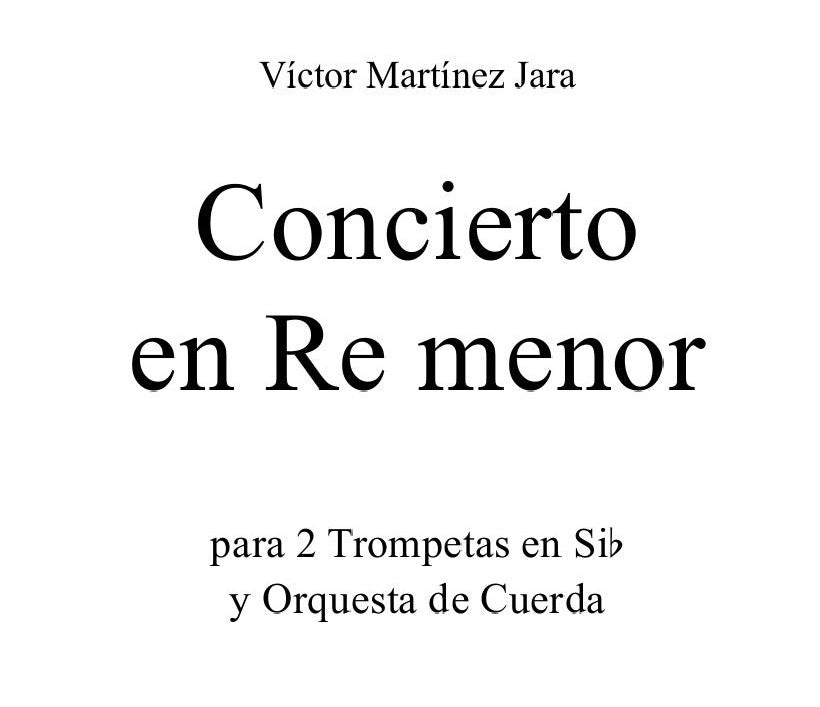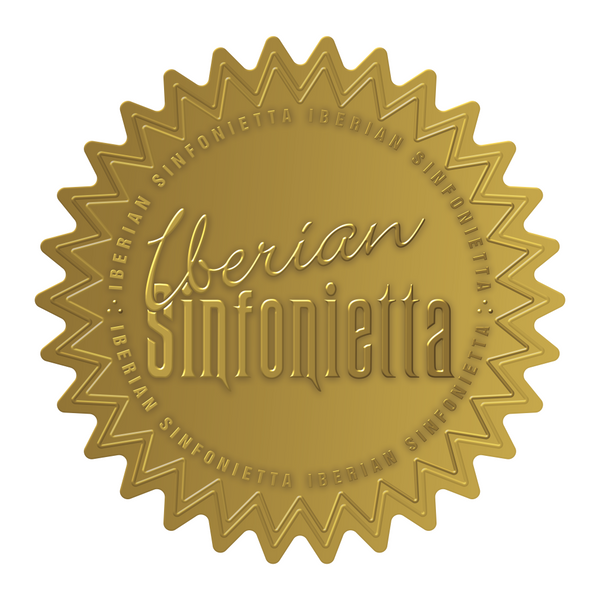
WE TALK WITH THE TWO SOLIST TRUMPEETERS OF THE NEXT CONCERT ON MARCH 13: ALEJANDRO GÓMEZ AND DAVID GUILLÉN

Dear public
There is barely a week left before our next appointment with the Iberian Sinfonietta Concert, on Saturday, March 13 at 12:00 at the Peace Palace in Fuengirola. Throughout these last entries and ending with the one we publish today, we have met the performers, composers and also the works that we will be able to enjoy next Saturday. We can say that it will be a very special event due to the number of incentives , Piazzola, Solo Accordion, Premiere of the version, the Iberian Sinfonietta itself... or the work that we will talk about today and which is an Absolute Premiere .
As you know, the Concert has been titled “ From another prism ”, in this very poetic way it alludes to the fact that current composers continue to be inspired by classical forms or styles that history gives us but they, from another prism, use them. This will demonstrate that there is nothing better than assuming the great past of classical music and naturally, without revolutions, incorporating improvements or new points of view. That is natural evolution .
In this sense, we must talk about what will happen as soon as the curtain opens, when the first of the works begins, the “ Concert for Two Trumpets in D Minor ”, a composition by the young composer Víctor Martínez Jara . And what will happen is that we will hear a Concerto for two trumpets, which takes us back to the form and concept of the Concerto, which is a baroque form in which a soloist or a duo, like on this occasion, developed a dialogue with or in front of the orchestra. In the case of a Concerto for two soloists, things get complicated, since there are many more options. In any case, it is starting from a classic way but from the present day. Today, we will also use that baroque form for our interview! So we will ask the same question to each of the two soloists, something very pleasing to this baroque form. Yes, we must warn that both soloists are great professionals, with a great relationship off and on stage, but as you will see, each one with their own criteria. We invite you to get to know them a little more, on Saturday you will be able to listen to them.

Good afternoon Alejandro Gómez and David Guillén , we are delighted to have your presence for this Absolute Premiere that we will enjoy next Saturday. We ask you a question and each one of you gives us your point of view.
What do you think of this Concert by Víctor Martínez Jara that you premiere on Saturday?
Alejandro Gómez : I think it is an interesting concert that could be very good for both musicians and the public. In the line that he marks, remembering Vivaldi, Soler or Rossini, I think he does a good treatment of the trumpet.

David Guillén : The work, in my opinion, is a beautiful piece structured from its own polystyling derived from the study of some of the multiple historical aspects and aesthetics. It is very clear, concrete and effective music that, due to its good workmanship, exposes the virtue of difficult ease. The score, from my impression, has remembrances of Vivaldi's Concerto in C for two trumpets and string orchestra, due to the successive questions and answers carried out by the two soloists and which, at times, the author himself reviews as an echo (the second with with respect to the first). Likewise, some main passages of the two trumpets are structured based on the game of arpeggios, structuredly organizing the mutual dialogue. However, the writing is typical of the 21st century, since the trumpet roles present very virtuosic resources that are articulated, for example, from occasionally distant intervallic jumps, as well as chords with elegantly crafted tensions. Without a doubt, a substantial score that, if the composer allows me, I would like to include in the curriculum of the Superior Conservatory of Malaga.

This Concert gives a different voice and personality to each soloist. What do you highlight about the role of your part in the Concert, since each trumpet has its own and different voice?
David Guillén : It is evident that each voice is different, but, at the same time, both appear concatenated and concomitant throughout the three movements. Obviously, the second voice, which is the one I play, presents some episodes of accompaniment when the first is the one singing. With this pairing you get an exciting sensation, since with good practice you will be able to hear the resulting natural harmonics that give so much beauty to the union of the two voices. But, except for those moments, I believe that the two voices are really soloists, with neither of them generally being overshadowed by the other. I think that the composer has created a well-formed structure where both trumpets build a single body, supported by the orchestral mass. On the other hand, I have to say that I am very happy to be able to play it with Alejandro, since in addition to being an excellent trumpet player, he is a performer who takes all these resources into account, so we will enjoy it a lot.
Alejandro Gómez: I think that the voice of the first trumpet, both in the first and third movements, manages to camouflage very well the apparent simplicity behind a certain technical difficulty. That caught my attention. I think it is the typical concert in which the best possible criticism is to be told that the concert was very simple. Sign that you have done well.
At what point is current trumpet literature?
David Guillén: Currently, many works are written for the trumpet although, sometimes, these are not disclosed (or they are not allowed to be disclosed) and, therefore, sometimes there is no possibility of knowing that they exist or at least, that they are known. can locate. Today, there are scores with many very interesting formats and instrumentations, such as guitar and trumpet. Thanks to the renewed techniques of the instrument, the trumpet can reach all its registers, taking the dynamics to the extreme, so new mixtures of timbres can be made.
On the other hand, the fact that the new works are not as well known could be because some of us trumpet players do not leave the classical repertoire, that is, from the concerts that are very well known and that, on occasions, do not allow that incipient works can come to light. However, I think that fortunately, nowadays is when more is written for our instrument and, in many cases, in a way as accurate as happens with the work of Víctor Martínez.
Alejandro Gómez : At a very good time, especially in our country, Spain. There are many composers who have been betting on the characteristics of the trumpet for some time now. It is true that the difficulties we encounter today are no different from those of previous decades; the possibility of premiering these works.
An interesting aspect of recent decades is that composition for solo trumpet and band, solo trumpet and piano or other ensembles has greatly increased compared to the classic trumpet and orchestra. I see it as very accurate since the possibilities of playing with an orchestra for a trumpeter are practically nil. In return, exploiting the trumpet-band binomial has been very intelligently encouraged.
I think that the trumpet is in a good moment as an instrument within the musical panorama but, very different, within the panorama of concert programming, managers, etc., where it is still much more profitable to program a work for piano or violin.
Jorge Rodríguez Morata
Pedagogical content coordinator
